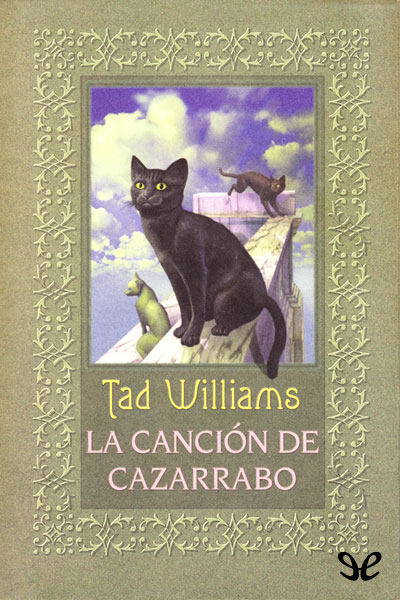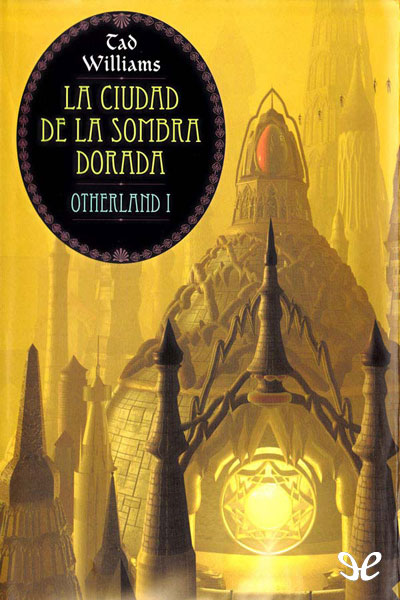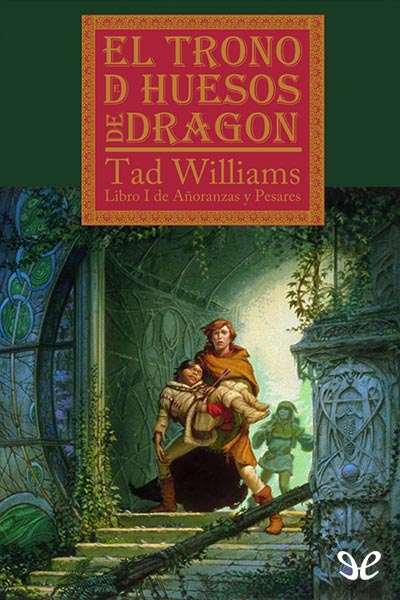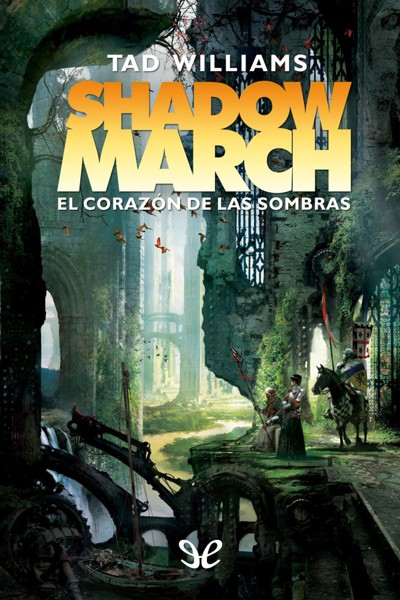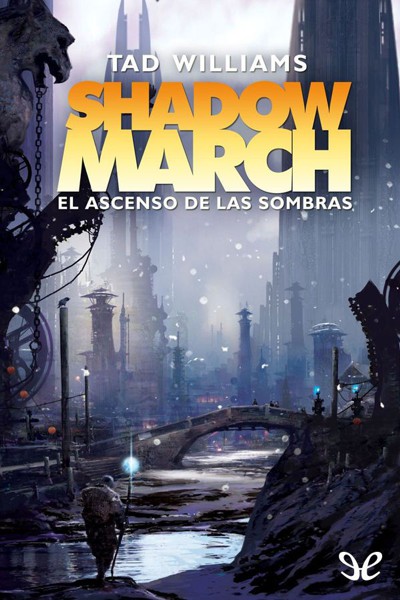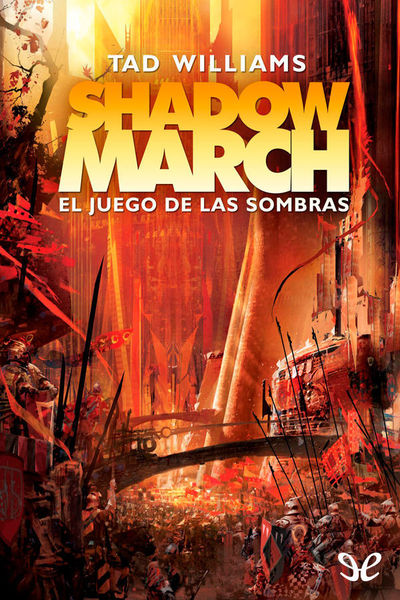oleebook.com
El trono de huesos de dragón (Añoranzas y pesares #01) de Tad Williams
de Tad Williams - Género: Ficcion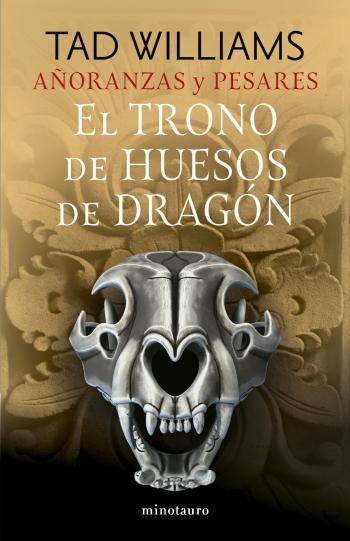
Sinopsis
Reedición de esa saga de Fantasía épica.
La historia se inicia cuando, a la muerte del Rey Supremo, una gran guerra está a punto de estallar en la pacífica tierra de Osten Ard, alimentada por los oscuros poderes de la brujería. Solo la Liga del Pergamino, un pequeño grupo de personajes, puede salvar el reino mediante la búsqueda de tres espadas de poder, perdidas hace mucho tiempo. Para ello tendrán que enfrentarse a enemigos salidos de las peores pesadillas de los creadores de leyendas.
Libros Recomendados - Relacionados
Reseñas Varias sobre este libro
This review is a copy of the transcript of my video review on The Dragonbone Chair.
Incredible. The Dragonbone Chair is an absolutely brilliant transition from classic to modern epic fantasy.
When you stopped to think about it, he reflected, there werent many things in life one truly needed. To want too much was worse than greed: it was stupiditya waste of precious time and effort.
To say I was excited to read The Dragonbone Chair is an understatement. The Dragonbone Chair and the entire Osten Ard Saga has been in my TBR pile for five years now. It's not I didn't want to read it sooner. But I've been waiting for the completion of The Last King of Osten Ard, the second series in The Osten Ard Saga, to be completed before I start reading the series. And now that The Navigator's Children, the final book in The Osten Ard Saga, is slated to be released soon, this feels it is the right time for me to start my journey into the world of Osten Ard. I dont regret reading The Dragonbone Chair. If theres a tiny seed of regret, it would have to be why didnt I read this sooner. I had a lot of high expectations going into The Dragonbone Chair, and all of it was met or exceeded. People have told me I would love The Dragonbone Chair, the first book in Memory, Sorrow, and Thorn trilogy, or The Osten Ard Saga, and they were right. They were absolutely right. Not including books I reread, I believe this is the fourth book to receive a 5-star rating from me this year. And I have no doubt I will reread The Dragonbone Chair, and Im assuming the rest of the series as well, again and again in the future.
He who is certain he knows the ending of things when he is only beginning them is either extremely wise or extremely foolish; no matter which is true, he is certainly an unhappy man, for he has put a knife in the heart of wonder.
A war fueled by the powers of dark sorcery is about to engulf the land of Osten Ard as John the Presbyterthe Lord of Erkynland and High King of all Osten Ard and bane of the dragon Shurakaiis near his death. A civil war for The Dragonbone Chair is about to start. The vengeful undead ruler of the Sithi, The Storm King, aims to seize this chance to return and regain his lost realm. And Simona kitchen boy in the royal castle of Hayholtwill involuntarily find his fate tangled in all the chaos to unfold caused by the inevitable death of John, the scourge of the Sithi and wielder of the sword Bright-Nail. This is more or less the premise of The Dragonbone Chair, the first book in Memory, Sorrow, and Thorn trilogy by Tad Williams. If you have heard about this book or this series, you might have heard about three things. First, it is a seminal fantasy work that inspired some of the most successful fantasy authors Patrick Rothfuss, George R. R. Martin, and Brandon Sanderson. Second, it is often stated that Memory, Sorrow, and Thorn felt a series that paved the way from the classic fantasy to the modern epic fantasy series we have these days; I can agree with that simply from having read The Dragonbone Chair. But I want to address the third thing you might have heard about The Dragonbone Chair first: the pacing.
Books are a form of magic because they span time and distance more surely than any spell or charm.
Everyone has their own reading taste and preference, but based on my experiences and everything I've heard, the negative reception of the pacing felt exaggerated. The Dragonbone Chair was written and published before I was born, and right from the start, it is more compelling than many modern fantasy books I've read. But it is true that if you, me a few days ago, are a reader who hasn't started your journey into the classic fantasy world of Osten Ard, it is worth knowing that Part 1 of 3 of the novel, or the first 200 pages, can be categorized as the slice-of-life portion. Also, if you love Robin Hobb's prose in The Realm of the Elderlings, as I do, there is a good chance Tad's prose will suck you into the story with ease. I knew about these two points thanks to my viewers before I started reading it, and it was helpful for me to make sure I was in the correct reading mood for a fantasy book with prose to savor. But this does not mean the beginning portion was boring, not from my perspective and experience.
A piece of writing is a trap and the best kind. A book, you see, is the only kind of trap that keeps its captivewhich is knowledgealive forever.
This beginning section was cleverly utilized to gradually introduce the main characters, world-building, and history of Osten Ard with minimal conflicts and actions. Though, in the first place, I don't think I ever heard anyone call Memory, Sorrow, and Thorn an action-oriented fantasy series, definitely not for The Dragonbone Chair. And I am so thankful for this. Not only do I rarely get to read a writing style as exquisite as Tad Williams', but lately, whether it's due to a streak of bad luck or not, it seems rarer to find modern fantasy books that take their time to introduce the characters and the world first before plunging them into danger all the time. This is coming from me as a reader who, comparatively, prefers reading modern epic fantasy books published after the late 90s rather than classic fantasy books. But here is the thing, action scenes being prioritized, especially from the beginning of a series, over characterizations is an effortless way to make me lose interest in a fantasy book quickly. And honestly, I feel this is happening more frequently lately. Some people mentioned they couldn't stand the slice-of-life portion of The Dragonbone Chair, and I respectfully disagree. I could've read Simon's time at Hayholt for another 100 pages; Tad's prose was that good, and the storytelling was surprisingly very character-driven, just the way I prefer.
But remember this lesson, Simon, one fit for kings... or the sons of kings. Nothing is without cost. There is a price to all power, and it is not always obvious.
Picture: The Dragonbone Chair by Tad Williams
The character-driven narration was a surprise for me. I mentioned earlier that I tend to not click with many classic fantasy books I tried, and the main reason was because of this. Not for all classic fantasy books, of course, but from the ones I have read, the characterizations in many of these books weren't good or compelling enough. Plus, the writing style implemented into these books often leans toward omniscient and head-hopping, and they are not my preference for reading. These are not the case with The Dragonbone Chair by Tad Williams. Head-hopping or omniscient is close to non-existence, and it was easy for me to tell which character's thoughts and POV I was reading from. Most importantly, I felt invested in Simon's, Binabik's, Josua's, and all the character's predicaments and struggles quickly. Right from the beginning, Simon's personality, actions, and relationship with his mentor, Morgenes, and caretaker Rachel were sufficient to make me care about him. I feel Simon behaved and reacted genuinely a teenager his age, and things only improved with each page turned. Especially after Simon meets Binabik and his animal companion, Quantaqa. The themes of justice, war, vengeance, honor, friendship, and life and death in this coming-of-age epic fantasy were beautifully told through the character's perspectives. And I'm not exclusively talking about the protagonists. I found the antagonists intriguing, too, thanks to the super strong foundation and background established by world-building and lore.
Honor is a wonderful thing, but it is a means, not an end. A man who starves with honor does not help his family, a king who falls on his sword with honor does not save his kingdom.
I am utterly impressed by the world-building. The way the past and lore are integrated into the current plotline and conflict was incredibly well-written. The best kind of world-builders, in my opinion, can pull me inside the world they made, and in the first book of their series, they can make me feel I am not missing anything from starting the series there. However, at the same time, they can make me realize the wealth of stories that can be crafted from the rich history is there, and should the author choose to do so, it will be possible to do it right. Some popular fantasy series examples for this are J.R.R. Tolkien with The Lord of the Rings and Silmarillion, or George R.R. Martin with the current five books in A Song of Ice and Fire and the prequel novels, Fire and Blood and A Knight of the Seven Kingdoms. This notion has been achieved magnificently in The Dragonbone Chair. I believe Tad Williams has indeed published a prequel novella titled Brothers of the Wind detailing the story of Ineluki the Storm King. And I already look forward to reading that prequel novella. I was so engrossed in the intricate history of Osten Ard. Every moment of reading the tale of The Sithi, the dragons, The Green Angel Tower, the rivalry between John Presbyter and the last prince of Nabbanai Royal House, Camaris-sa-Vinitta, and of course, the three Great Swords that become the name of the seriesMemory, Sorrow, and Thornwere superbly engaging. I am serious. Every description and passage related to the forging and legends of the three great swords, specifically on Sorrow (Jingizu in the Sithi language) and Thorn in this book, made me so excited. Here's one small example:
Haggard, sick to madness, yet full of grim resolve, he watched the master smiths of Asua flee before him and did not care. By himself he heated the forge fires hotter than they had ever been; alone he chanted the Words of Making, all the while wielding the Hammer That Shapes, which none but the High Smith had ever held before.
Alone in the red-lit depths of the forge he made a sword, a terrible gray sword whose very substance seemed to breathe dismay. Such hideous, unholy magics did Ineluki call up during its forging that the very air of Asua seemed to crackle with heat, and the walls swayed as though struck by giant fists.
Wasn't that so badass!? For the lack of a better word, I think it is so damn cool, and that's only a taste of Tad's breathtaking prose. There were also Buddhist and Japanese-inspired names Shurakai (meaning "world of asuras") and Hidohebhi the Black ("horrible serpent") that I enjoyed reading. Another example is Jiriki, which means "One's Own Strength" in Japanese Buddhist terms. It is a term for self-power or the ability to achieve enlightenment, and yes, this is a fitting name for the character. You have to find out the rest for yourself. But just from the first book of the series alone, the world of Osten Ard felt more fleshed out than most modern fantasy books I read lately. Once again, I love reading modern epic fantasy novels. Many of them have their own captivating world-building. But to find one as detailed, livable, and immersive as the world of Westeros, Middle-Earth, Roshar, Dara, and Osten Ard are always a challenge. And the settings inside this book... They're wondrous to witness. The glorious Dragonbone Chair in The Hayholt, a thousand nails of Naglimund, the forest, the snowy landscape or Urmsheim, to the majestic Da'ai Chikiza, it felt a blessing and honor to read a transportive epic fantasy of this caliber.
You see the land is a book that you should be reading. Every small thing,a cocky grinis having a story to tell. Trees, leafs, mosses and stones, all have written on them things of wonderful interest.
Picture: Da'ai Chikiza by Donato Giancola
Before I end this review, I need to give my thoughts on using The Grim Oak Press edition of The Dragonbone Chair that I bought. As I mentioned in my unboxing video, this was the first time I purchased a limited special edition of a book I hadn't read yet. I have no doubt I would end up loving The Dragonbone Chair if I had read it from the standard physical copy or ebook edition, too. But I can't deny reading The Dragonbone Chair for the first time using the Grim Oak Press edition played a part in my increased reading enjoyment. The feel of the premium paper, the Smyth-sewn binding, and the illustrations by Donato Giancola all enhanced my reading experience. Donato Giancola is one of my favorite artists. The cover art and the six gorgeous interior artworks by Giancola made me take a risk at buying my first Grim Oak Press special edition, and the gamble paid off nicely. The cover art is one of the best I've ever seen, and although some readers understandably mentioned the cover art gives off the false impression that the book would be action-packed, the cover art IS from an action scene inside the book. I mentioned earlier that The Dragonbone Chair contains minimal action scenes, but rest assured, when these scenes take their spotlights, Tad Williams made them count.
Neither War nor Violent Death have anything uplifting about them, yet they are the candle to which Humanity flies again and again, as complacently as the lowly moth. He who has been upon a battlefield, and who is not blinded by popular conceptions, will confirm that on this ground Mankind seems to have created a Hell on Earth out of sheer impatience, rather than waiting for that original to whichif the priests are correctmost of us will eventually be ushered.
Picture: The Dragonbone Chair cover art by Tad Williams
As you can probably tell, I absolutely loved The Dragonbone Chair. Not including books I reread, this is the fourth book I rated with a 5/5 star rating this year, and it is effortlessly one of the most stunning first books of a series I had the pleasure to read. For many years, I kept hearing how Memory, Sorrow, and Thorn inspired Sanderson, Martin, and Rothfuss to write their own magnum opus. But it is frankly shocking and sinful how The Dragonbone Chair or Memory, Sorrow, and Thorn to this day is not equivalent to the popularity of these three authors. I know I have not read The Stone of Farewell and To Green Angel Tower yet, but The Dragonbone Chair already strongly signals this is a book and series that should be discussed and praised as common as The Stormlight Archive, The Realm of the Elderlings, The Lord of the Rings, A Song of Ice and Fire, or The Kingkiller Chronicle. Not only that, whether voluntarily integrated or not, I saw the touch and influence of Tad Williams' storytelling structure and atmosphere in many other modern epic fantasy series now. The Dragonbone Chair and The Iron Throne? The scene of a comet that bleeds across the sky reminded me of the prologue of A Clash of Kings. Simons apprenticeship under Morgenes felt similar to Fitz's apprenticeship under Chade. Or how reminiscent Simon's first time outside of Hayholt was of Kvothe's pre-Tarbean survival section. This is truly a classic epic fantasy bridge to modern epic fantasy. I am glad to have read this, and I look forward to reading the sequel, The Stone of Farewell, next month. I don't want to jinx it, but if all the sequels go well for me, Memory, Sorrow, and Thorn or the entire Osten Ard Saga might end up becoming one of my top favorite series.
Never make your home in a place Make a home for yourself inside your own head. Youll find what you need to furnish itmemory, friends you can trust, love of learning, and other such things.
You can order this book from: Blackwells (Free International shipping)
You can find this and the rest of my at Novel Notions | I also have a Booktube channel
Special thanks to my Patrons on Patreon for giving me extra support towards my passion for reading and reviewing!
My Patrons: Alfred, Aliysa, Anastasia, Andrew, Andrew W, Annabeth, Arliss, Barbara, Brad, Cade, Casey, Chris, Diana, Donna, Dylan, Edward, Elias, Ellen, Gary, Hamad, Helen, Jenn, Jesse, Jimmy Nutts, Joie, Kristina, Luis, Lufi, Melinda, Michael, Michael, Miracle, Nicholas, Norbert, Radiah, Samuel, Sarah, Sarah, Scott, Shawn, Tori, Tracy, Wendy, Wick, Xero, Yuri, Zoe.favorites tbr-physical-books368 s Dirk Grobbelaar600 1,139
He who is certain he knows the ending of things when he is only beginning them is either extremely wise or extremely foolish; no matter which is true, he is certainly an unhappy man, for he has put a knife in the heart of wonder.
- Qanuc Proverb
The Dragonbone Chair is chock and block full of wonder. If you have the patience to master this piece of work (it is incredibly dense and filled with first class world building and heaps of lore) you'll find it an extremely rewarding experience. It is a slow burner, especially the first third of the novel (titled Simon Mooncalf), but once the simmer turns into a boil there's no stopping the story.
Recommended for everybody who s their fantasy served with a hefty dose of EPIC. books-i-own fantasy favourites ...more190 s carol.1,626 8,821
A classic in the fantasy field, this is best suited for readers looking for the traditional orphan-identity quest. While I enjoyed it overall, I was able to set the book down and walk away, coming and going from the story until Simon reached the woods. I consider it a bad sign when I'm able to set a book down--my favorites have me locked into reading position until I reach the end page. Eventually it picked up and reeled me in, but there was skimming involved.
A combination coming-of-age and castle/kingdom political novel, I felt the book would have benefited more from focusing on one or the other. As it was, the politics were mostly the side story, and I largely skimmed over those sections of the book without any real decrease in enjoyment of Simon's story. It's classic high fantasy, with full landscapes and world building, starting from the castle to underground tunnels to a deep forest, to a deserted Sithi (read elven) city, a highlands castle and a mountain. When the book ends with Simon and other adventurers sent on a journey for a missing sword, it's almost shocking that it's not a ring.
I that Williams' world contains non-human races. There is the most interesting take on trolls that I've read yet--Binobik and his wolf quickly became my favorite characters. The white hounds and the Bakken bring nicely frightening elements to the story.
One frustration is that Simon's development seemed very uneven and unly to me, that parts of his political and intellectual consciousness seemed so limited even when being taught by the doctor. He does indeed behave a fourteen year old boy at the beginning of the story, and credit to Williams for capturing that well enough to be annoying. Every time you turn around, he's complaining about reading, and his refrain lasts for some time even into his forest journey. However, rescuing the Prince should have been the beginning of a political awakening . We very much get the "boy buffeted about by the winds of fortune" storyline, but he remains clueless every step of the way. Then suddenly he develops a sense of honor towards his kidnappers--that almost results in repeated injury by the Bakken. This was the Simon who had no honor towards shirking workloads in the castle, and who discovered a monk had fleeced him--twice--and has resolved to guard himself more closely? It's that kind of uneven characterization that makes him frustrating to root for as a lead, being so malleable and of almost no strong principles. I did that he was open-minded enough to befriend a small person.
I didn't find the writing particularly impressive or beautiful, and it is odd to have bold and italicized words. The song lyrics are often distracting, but occasionally add some richness to the story. It feels it was trying hard to be capital "E" epic, and the cliffhanger ending is an annoyance. I'll grab the next one from the library.classic fantasy meh ...more157 s Matt's Fantasy Book Reviews310 5,710
DNF @ 60%.
I know people say that the book picks up towards the end, but this is a huge book and I've lost all will to continue on. I'm bored to tears here people!146 s1 comment Melissa ? Dog/Wolf Lover ? Martin3,599 10.7k
Ok, so Ive decided to go back to my original rating of 2 stars even though I had given it 4 stars as it got a bit better later on. I have had the next books in the series for a few years and they just have to go. Im not interested in continuing the series so in the trade box they go. Thank you and goodnight
Autor del comentario:
=================================


